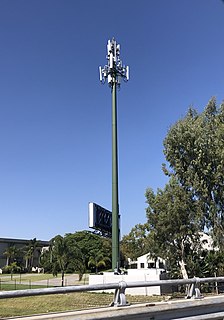Telecommunications in the Dominican Republic include radio, television, fixed and mobile telephones, and the Internet.
Telecommunications in Namibia include radio, television, fixed and mobile telephones, and the Internet.
Telecommunications in Senegal include radio, television, fixed and mobile telephones, and the Internet.

Telecommunications infrastructure in South Africa provides modern and efficient service to urban areas, including cellular and internet services. The Independent Communications Authority of South Africa (ICASA) is the watchdog of the telecommunications in the country.
Telecommunications in Sudan includes fixed and mobile telephones, the Internet, radio, and television. Approximately 12 million out of 45 million people in Sudan use the Internet, mainly on smartphones and mobile computers.
Telecommunications in Eswatini includes radio, television, fixed and mobile telephones, and the Internet.

The National Telecommunications and Information Administration (NTIA) is an agency of the United States Department of Commerce that serves as the President's principal adviser on telecommunications policies pertaining to the United States' economic and technological advancement and to regulation of the telecommunications industry.
Telkom SA SOC Limited is a South African wireline and wireless telecommunications provider, operating in more than 38 countries across the African continent. Telkom is majority-privatised with it being 39% state-owned enterprise.
Neotel, previously SNO Telecommunications, is the second national operator (SNO) for fixed line telecommunication services in South Africa. It was unveiled on 31 August 2006 in Kyalami in northern Johannesburg. Neotel is South Africa's first direct telecommunications competitor to the current telecommunications parastatal, Telkom.

The Internet in South Africa, one of the most technologically resourced countries on the African continent, is expanding. The Internet country code top-level domain (ccTLD) .za is managed and regulated by the .za Domain Name Authority (.ZADNA) and was granted to South Africa by the Internet Corporation for Assigned Names and Numbers (ICANN) in 1990. Over 60% of Internet traffic generated on the African continent originates from South Africa. As of July 2016, 29.3 million people were Internet users.
The Internet in Bulgaria began to offer full TCP/IP services in 1992, although e-mail, network news, and some other Internet services were available earlier, during the period from 1989 to 1991. The .bg top-level domain name was organized in 1991. Internet speeds and connection reliability in the capital, Sofia, are consistently ranked among the fastest in the world by several independent studies.
The Internet in Croatia became a reality in November 1992 when the first international connection linking Zagreb and Vienna became operational.
The Internet in Portugal achieved a penetration rate of about 64% of the population in 2012. With an average peak Internet access speed of 34.5 megabits per second, Portugal stood seventeenth on the list of countries with the fastest Internet access.
The Internet in Poland was used by 90.4% of households in the country and 98.6% business entities in 2020. In 2021, the percentage of households with internet will increase to 92.4%.
The Internet in Botswana is used by about 28.4% of the population. This is slightly lower than the figure of 28.6% for Africa as a whole in 2015.
Telecommunications in Costa Rica include radio, television, fixed and mobile telephones, and the Internet.
Telecommunications in Cyprus includes radio, television, fixed and mobile telephones, and the Internet, in the Republic of Cyprus.

South African wireless community networks are wireless networks that allow members to talk, send messages, share files and play games independent of the commercial landline and mobile telephone networks. Most of them use WiFi technology and many are wireless mesh networks. A wireless community network may connect to the public switched telephone network and/or the Internet, but there are various restrictions on connectivity in South Africa. Wireless community networks are particularly useful in areas where commercial telecommunications services are unavailable or unaffordable.

Broadband is a term normally considered to be synonymous with a high-speed connection to the internet. Suitability for certain applications, or technically a certain quality of service, is often assumed. For instance, low round trip delay would normally be assumed to be well under 150ms and suitable for Voice over IP, online gaming, financial trading especially arbitrage, virtual private networks and other latency-sensitive applications. This would rule out satellite Internet as inherently high-latency. In some applications, utility-grade reliability or security are often also assumed or defined as requirements. There is no single definition of broadband and official plans may refer to any or none of these criteria.




